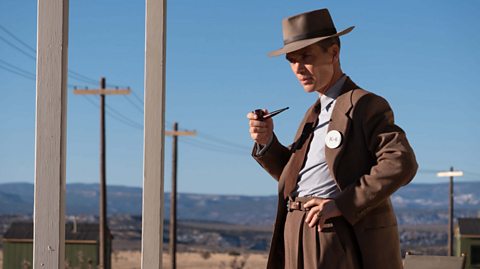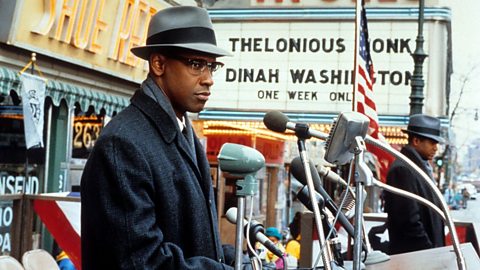From James Marsh's The Theory of Everything to Bryan Singer's Bohemian Rhapsody, the last few years have seen a real surge of biopics.
And there's more to come. Amy Winehouse's biopic Back to Black will be released in April 2024, and director Sam Mendes has announced he plans to make not one but four biopics about The Beatles, one for each member of the band.
So there's no shortage of them, but what counts as a biopic? We answer some popular questions about this film genre.

1. How do you pronounce biopic, and what does it mean?
Biopic is short for ÔÇśbiographical pictureÔÇÖ, where 'picture' is an old-fashioned word for a film or movie. ItÔÇÖs pronounced bio (that's b-eye-o)-pic.
Biopics are a genre of film that tell the story of a single, real personÔÇÖs life - or at least a part of that life that is historically important or interesting.
Biopics have often been made about well known historical figures. Recent examples include director Christopher NolanÔÇÖs Oppenheimer (2023) about the inventor of the atomic bomb, or Elvis (2022) about the life and career of Elvis Presley.
But sometimes theyÔÇÖre made about ordinary people whose lives were interesting, important or dramatic in some way. For instance, A Beautiful Mind (2001) starred Russell Crowe as brilliant mathematician John Nash, who developed schizophrenia soon after publishing some of his breakthrough works.

2. What was the first biopic?
Biopics go right back to the beginnings of cinema. The first movie audiences were understandably fascinated with the idea of seeing historical figures, who they could only previously read about or see in paintings, brought to life. One of the earliest films ever made, Joan Of Arc directed by Georges M├ęli├Ęs (1900), was a biopic.
Other famous biopics from movie history include Abel Glance's Napoleon, The Diary Of Anne Frank by director George Stevens (1959) and David Lean's Lawrence Of Arabia (1962).
More recent successful biopics include Bradley Cooper's Maestro, about the life of composer Leonard Bernstein (2023), and Terence DavisÔÇÖs Benediction (2021) about the life of war-poet Siegfried Sassoon.

3. WhatÔÇÖs the difference between a biopic and a historical drama?
The categories often blur into each other, but itÔÇÖs really all about the main subject of the film. A biopic is about a person, while a historical drama is generally about an event or period in history.
So, to take a couple of recent examples, while Martin ScorseseÔÇÖs The Killers Of The Flower Moon features real historical figures, it focuses on an event (the murders of the Osage tribe of Native Americans in 1920s Oklahoma) rather than any single life, and so is best described as a historical drama.
Ridley ScottÔÇÖs Napoleon, on the other hand, is all about the the French leader's rise to power, so most people would call it a biopic.
Equally Spike LeeÔÇÖs Malcolm X (1992) is all about the life of the civil rights leader, and so is considered a biopic. Selma (2014) mainly focuses on the civil rights marches of the 1960s, and so some would argue it's a historical drama.
4. WhatÔÇÖs the difference between a biopic and a docudrama?
Muddying the water a bit is the term ÔÇśdocudramaÔÇÖ. ItÔÇÖs most often used about TV programmes rather than cinema, but occasionally it's applied to movies as well.
Docudramas use actors and dramatic techniques to tell the story of real, usually contemporary events. A recent example is ITV's Mr Bates vs The Post Office (2023) which covered the Post Office scandal and subsequent fight for justice for those involved.
A docudrama might focus on a character like sub-postmaster Alan Bates, but it wouldnÔÇÖt be called a biopic because the real subject isnÔÇÖt their whole life but a specific thing that happened to them, and which affected lots of other people too.
And itÔÇÖs not a historical drama, because the events are too recent.
Sometimes the line between docudrama, historical drama and biopic is quite thin, and you could argue for any of the descriptions.
5. Are biopics always accurate?
No. A biopic has to fit a whole life, or a big part of one, into a single film. So, inevitably, huge amounts are left out. Sometimes screenwriters may choose to re-arrange the order of events to make things clearer. Fictional characters are sometimes invented to smooth the story out, or real characters are merged together - these are called ÔÇścomposite charactersÔÇÖ.
And, of course, sometimes the exact historical facts about someone's life are unknown or disputed. For instance Amadeus (1984), Milos ForemanÔÇÖs biopic of Mozart, was criticised for exaggerating the rivalry between Mozart and fellow composer Salieri. And The Greatest Showman (2017), which was about the life of circus impresario P.T. Barnum, controversially omitted his use of enslaved people in his shows.
So while a biopic is a great way to get into a subject, they are not always reliable sources of historical fact.

6. Does somebody have to be dead to have a biopic made about them?
Not always. Lots of biopics have been made about historical figuresÔÇÖ lives, but there are also biopics about living figures.
Examples of biopics of living people include The Social Network (2010) about Mark Zuckerberg and the founding of Facebook, and Rocketman (2019) which told the life story of Elton John.

7. Has anyone ever played themselves in a biopic?
Yes, but itÔÇÖs quite rare. In 1955 Audie Murphy, who was one of the most decorated American soldiers in World War II, played himself in To Hell And Back. Of course it helped that he was already a film star, having become a Hollywood actor after his return from the war.
In 1977, world champion boxer Muhammad Ali played himself in 1977 biopic The Greatest, and more recently Eminem played himself in 2002ÔÇÖs 8 Mile to critical and box-office success.
This article was published in April 2024
Five times the movies got their science right
Science fiction often has scientistsÔÇÖ eyes rolling, but some film writers and directors have gone above and beyond to get their facts spot on.

Six movie quotes that are victims of the ÔÇśMandela EffectÔÇÖ
You may be surprised at how many famous lines from movies we get wrong!

The mind-boggling time quiz
Famous historical events that will mess with your perception of time.
